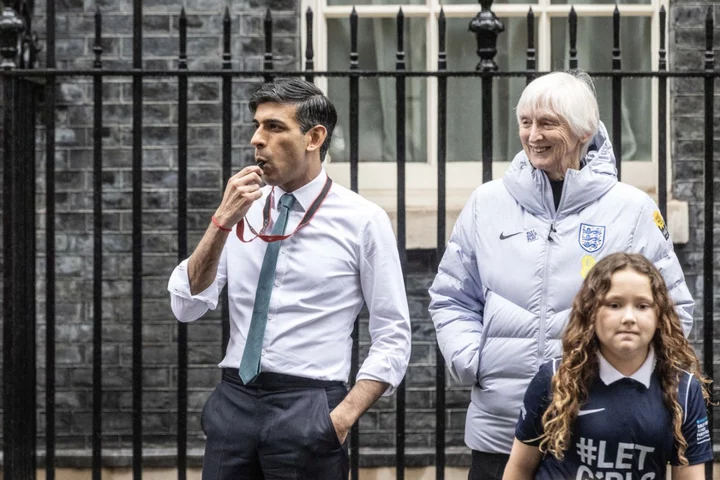
Sunak missed World Cup final because he has ‘huge amount of work to do’, minister says
Rishi Sunak would have “loved to” have watched the Lionesses in the Word Cup final but has “a huge amount of work to do”, a minister has said. Claire Couthinho claimed the prime minister would also not have flown to the World Cup final if the men’s team were playing because he is “so busy”. Asked whether the PM would have made the trip to Sydney, Australia if Gareth Southgate’s team were in the final two, the children’s minister said she did “not think he would have”. “But I do know how proud he is of the Lionesses like we all are, it’s such a tremendous achievement, it was absolutely just brilliant to see,” she told Sky News. Defending Mr Sunak over claims he was paying lip service to the women’s game by not attending, Ms Couthinho said: “The foreign secretary was there and the culture secretary was also there. “This government was represented. And I know that the prime minister would have loved to have been there but he’s also got a huge amount of work to do. “And I think the travel time is probably difficult. But I know how proud he is of the Lionesses. “We all are. It’s an amazing achievement to get to a World Cup final. It’s absolutely extraordinary.” It came as World Cup legend Sir Geoff Hurst said a member of the royal family “should definitely” have attended the final. Asked if a member of the royal family not attending was a mistake, he told BBC Radio 4’s Today programme: “Yes, I do. I think if the royals attend the men’s game, they should definitely. “It’s an English team, a World Cup tournament, a member of the royal family should definitely have gone. “No argument at all about that.” Mr Sunak and the Prince of Wales faced a significant backlash over their decision not to attend the World Cup final in Australia, when England lost 1-0 to Spain. Critics argued the pay would travel to the game if the men’s team reached a World Cup final. Ms Coutinho went on to tell LBC that Mr Sunak is a “huge football fan” and a “big” fan of Southampton. “And he’s got two daughters. And he’s been so excited about the Lionesses,” she said. Asked which football team the PM supports, Ms Coutinho said: “The Southampton team. Is that the Saints? Yeah, he is a big Saints fan.” William and the Princess of Wales, Prince George, Princess Charlotte and Prince Louis watched the game together at their Anmer Hall country home in Sandringham, Norfolk. Read More Lionesses have ‘inspired millions’ despite falling short in first World Cup final Lionesses thanked for ‘inspiring millions’ as World Cup final set to give £185m boost to UK economy William and King tell Lionesses of nation’s pride despite World Cup final loss William and PM face running backlash over absence from World Cup final Prince William shares message after criticism for missing women’s World Cup Final ‘Disappointing’: Prince William blasted by Lionesses fans for missing Women’s World Cup final in Australia
1970-01-01 08:00
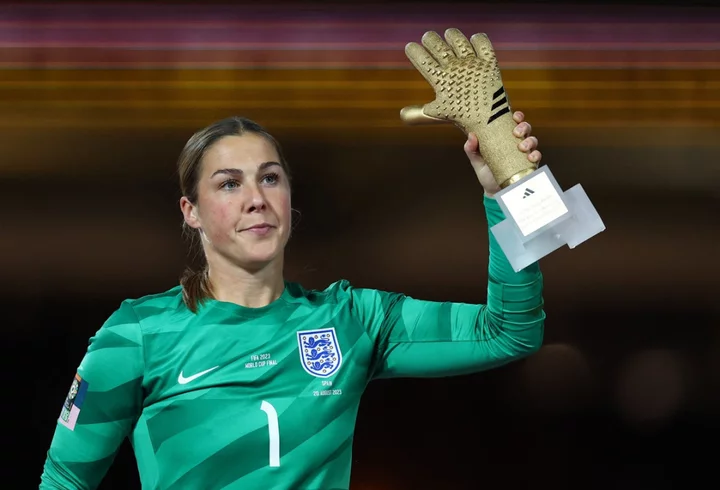
Mary Earps’ World Cup Golden Glove award still isn’t enough to convince Nike to sell her shirt
Fans of the Lionesses will still not be able to buy a replica of Mary Earps’ goalkeeper kit despite an ongoing campaign throughout the Women’s World Cup to convince kit suppliers Nike to put one on sale. Nike decided last month that it wouldn’t be making Earps’ goalkeeper kit available to purchase and the decision drew criticism from fans, celebrities, and even Earps herself who called the decision ‘hugely hurtful’. A petition was launched to persuade Nike into a U-turn and that momentum was boosted by England’s No. 1 during yesterday’s World Cup final as she saved a penalty before keeping England in a contest they ultimately lost 1-0. Earps was rewarded for her tournament performances with the World Cup Golden Glove award, the latest accolade added to her growing collection following the Best Fifa Women’s Goalkeeper award last year. Nike issued an update on their decision after fresh calls to produce Earps’ England shirt came flooding in following the 30-year-old’s incredible performance in the World Cup showpiece. In their statement released on Sunday, Nike promised to address the matter in ‘future tournaments’. It read: “Nike is committed to women’s football and we’re excited by the passion around this year’s tournament and the incredible win by the Lionesses to make it into the final. “We are proudly offering the best of Nike innovation and services to our federation partners and hundreds of athletes. “We hear and understand the desire for a retail version of a goalkeeper jersey and we are working towards solutions for future tournaments, in partnership with Fifa and the federations. “The fact that there’s a conversation on this topic is testament to the continued passion and energy around the women’s game and we believe that’s encouraging.” Speaking about Nike’s initial decision last month Earps was doing all she could to get them to change their minds saying: “I can’t really sugarcoat this any way so I’m not going to try, it’s hugely disappointing and very hurtful. “For my own family, friends and loved ones not to be able to buy my shirt, they’re just going to come out and wear normal clothes. All my team-mates, they’ve ordered a lot of shirts for their friends and family, they’re talking at the dinner table “I wasn’t able to get this” and I’m saying “I wasn’t able to get it at all”. “I know there’s a lot of people who have spent a tremendous amount of money on outfield shirts and then put ‘1 Earps’ on the back, which doesn’t sit well with me either. “It’s a very scary message that’s being sent to goalkeepers worldwide that “you’re not important”. It’s something that I’ve been fighting behind closed doors. I’ve been desperately trying to find a solution with the FA and with Nike.” FA Chief Mark Bullingham also had his say on the controversy earlier this week and claimed that the governing body had plans to find a positive resolution for all involved. He said: “Mary is incredibly passionate about growing goalkeeping, as are we. “We’ve got several schemes to get the next generation of goalkeepers coming through. We have got a plan for addressing that issue and it’s something we’ll get to after the tournament.” Read More Fans demand Nike sell Mary Earps’ shirt after keeper’s World Cup final heroics Lionesses have ‘inspired millions’ despite falling short in first World Cup final The anguish, emotion and the story of the Women’s World Cup in photos The thrills, shocks and many brilliant moments of the World Cup in pictures The sporting weekend in pictures We won’t stop – Georgia Stanway vows England will ‘continue to break barriers’
1970-01-01 08:00
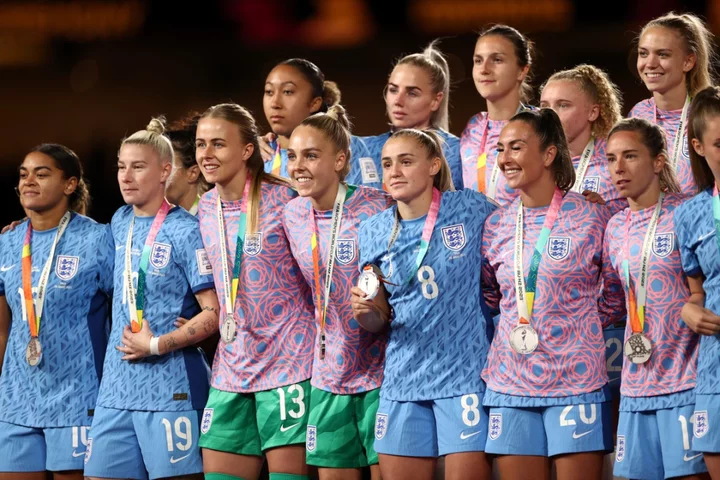
Lionesses receive surprise reception as they start journey back to England
England’s World Cup finalists received a warm welcome as they started their long journey back to the United Kingdom on Monday morning. The Lionesses, who reached the final of the Women’s World Cup, were agonisingly beaten by Spain 1-0 on Sunday. It was the first time any England team had reached the World Cup final in 57 years, but it was not to be and Olga Carmona’s goal secured a first trophy for Spain’s women’s team. Starting their journey home, the Lionesses were applauded through Sydney Airport by passengers in a heartwarming moment. https://twitter.com/Shaimaakhalil/status/1693467798708924701?s=20 https://twitter.com/TomJGarry/status/1693481744777822257?s=20 They walked through in their light blue England tracksuits as members of the public clapped them onto their plane, a fitting tribute to the team who had overcome adversity to reach the final. https://twitter.com/SuzyWrack/status/1693461973445288025?s=20 While it remains to be seen if there will be any events once the team arrive back to celebrate their achievement, it might have to wait until the heartbreak of the defeat has subsided. Sir Keir Starmer, the Labour leader has already led the calls for the Lionesses to be given honours after their journey to the final. It would be a worthy recognition of Sarina Wiegman’s side’s achievement, after just four members of the Euro 2022-winning squad were named in the New Year Honours list, with the rest of the team overlooked. Read More Mary Earps’ Golden Glove award isn’t enough to convince Nike to sell her shirt England’s impact will last far longer than pain of World Cup final defeat The thrills, shocks and many brilliant moments of the World Cup in pictures
1970-01-01 08:00
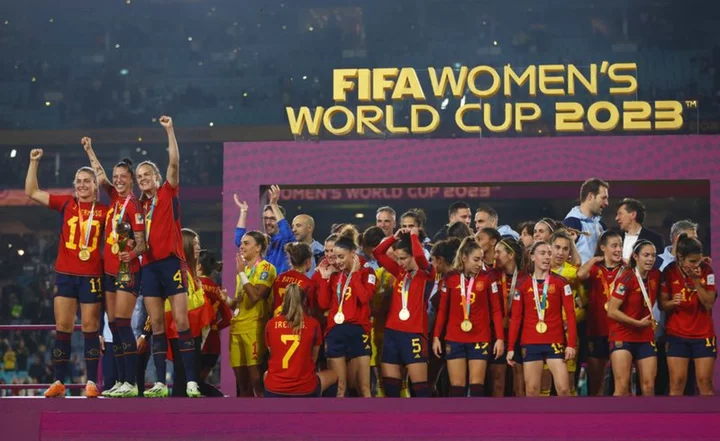
Soccer-Spain defeat England in final of record-breaking Women's World Cup
By Alasdair Pal SYDNEY Spain defeated England 1-0 in the Women's World Cup final on Sunday, capping off
1970-01-01 08:00
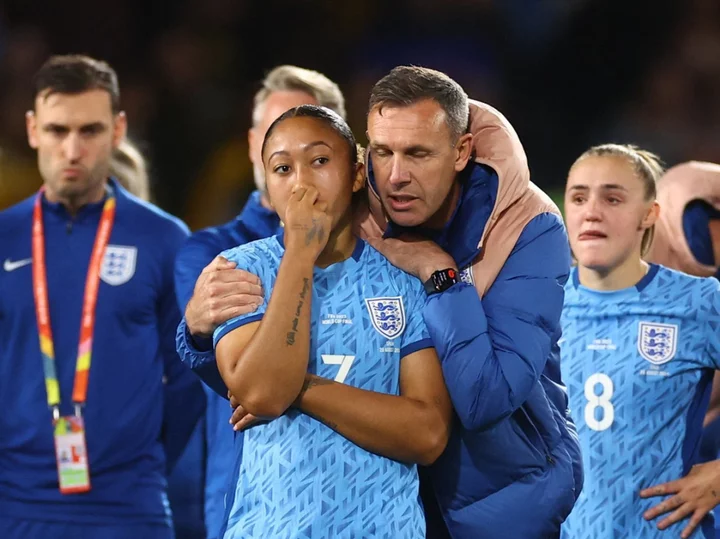
A change too far? England’s last roll of the dice comes up short
England had covered the gaps, they had filled the holes. They had adjusted, adapted, repositioned, created a new formation, and reached a first World Cup final. Then England changed again. Down 1-0 at half time in the World Cup final, Sarina Wiegman went for a last roll of the dice, a double substitution that saw Alessia Russo and Rachel Daly brought off and Lauren James and Chloe Kelly come on. That 3-5-2 that was England’s revelation of the tournament, that changed their World Cup? It was binned. England went back to 4-2-3-1. They disposed of the wing-backs and brought on the wingers. They stopped pressing Spain and abandoned their plan. With it, and for the first time at the World Cup, the Lionesses did not find the change that was required. James and Kelly brought moments of improvement, but the truth is that England were at their most dangerous when Lauren Hemp and Russo were combining as a front two. Hemp’s switch to a central role took away the threat that was everywhere in the first half and left Wiegman searching for something else. On came Beth England. Up went Millie Bright. But this was a situation England could not overcome. In a tournament that has been defined by England’s ability to adapt and solve the problems they have faced, the changes that were required against Spain were a step too far. Mary Earps’s save from Jenni Hermoso’s penalty gave England some momentum, but this was a final that stuttered and in the second half never found its rhythm, where stoppages played into Spain’s hands and covered the defensive frailties they had previously shown through the tournament. “When Mary saved the penalty I thought we’d go on and score the goal,” Wiegman shrugged. “But we didn’t.” Wiegman felt England improved with the changes and they certainly played with a better balance. But by then the game had changed and in its final moments, Spain managed to stay in control. While England never found the right combinations, Spain never quite felt threatened. While England played with two systems, neither one quite arrived at the right time. Perhaps this was always the natural conclusion for a World Cup that hit its first hurdle in November when Beth Mead suffered a torn ACL, then when England lost Leah Williamson, and then Fran Kirby; the deflating end to a tournament where Wiegman has not had the same consistency or continuity of last summer’s Euros, and where winning the final was beyond the resilience of this side. Perhaps it’s also the rebalance from last summer’s quarter-final in Brighton, where Spain were the better team and lost after England found a moment of magic through Georgia Stanway’s equaliser. England couldn’t produce another one; despite the introductions of Kelly and James, England were at their most threatening when they played into an open, frantic match, even if it left them more vulnerable at the other end and, ultimately, led to Olga Carmona’s winning goal. It was a quality finish, the moment to crown Spain’s golden generation, a magnificent team of sharp passers and quick minds. Aitana Bonmati was the clear player of the tournament and no one will be surprised when the Ballon d’Or follows at the end of the year. They looked a class above England, but the regret is that a head coach who appears to have no impact on how his team plays in Jorge Vilda did not need to have a tactical approach to beat the Lionesses. England gave Spain what they wanted. Wiegman committed to a brave plan but it gave England a hard time. They had pushed high and pressed Spain, hoping to force the error, with Lucy Bronze and Daly defending as forwards as much as wingers, gambling on a misplaced pass. But Spain were too good. They responded by playing through England, isolating a back three that had found strength in its unity. Spain pulled an already stretched team further out of shape and created another problem for England to solve. Bronze’s misadventure then led to another one. As Carmona fired past Earps, Bronze immediately sank to the pitch, as if her legs had been cut from beneath her, the sort of reaction that told you everything about where the goal had come from. It was a run that was too ambitious when what England needed to do was move it faster. Bronze was crowded out, England were outnumbered, and suddenly it was left to Russo to follow Carmona’s run. That was a gap in the team that England could not cover. There had been such a fine balance to it, an open game where the first goal was always going to be crucial. While the final was goalless, England had chances that came from their high press and then found spaces to hit Hemp down the channels. But when Spain scored, the space vanished and Wiegman needed to try something else to protect her side, even if it meant England lost some of their unpredictability. To reach this stage was a triumph of the team’s approach and its mentality; a campaign that always managed to deliver answers. Eventually, and on the biggest stage of all, England were unable to find another. Read More England suffer World Cup heartache as brilliant Spain show Lionesses what’s missing Jorge Vilda: Spain’s World Cup coach at the heart of a civil war England v Spain LIVE: Women’s World Cup final result and reaction as Lionesses suffer heartbreak England players ‘heartbroken’ after World Cup final defeat to Spain England suffer World Cup heartache as brilliant Spain show Lionesses what’s missing Sarina Wiegman has already made the biggest decision of England’s World Cup
1970-01-01 08:00
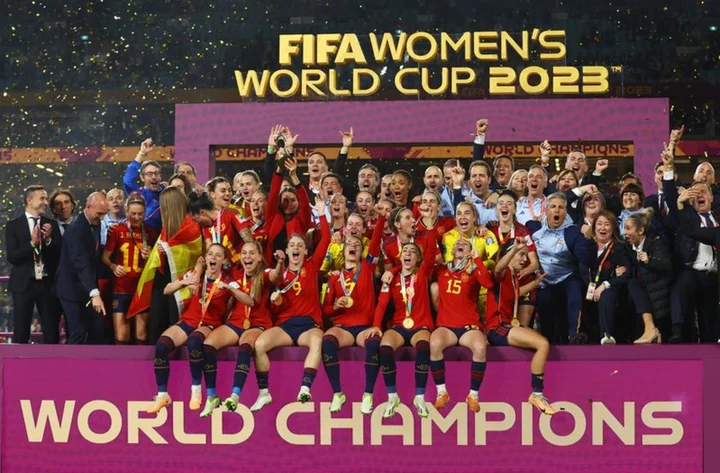
Soccer-Spain down England to win Women's World Cup for first time
By Nick Mulvenney SYDNEY Captain Olga Carmona scored the winner in the first half as Spain won the
1970-01-01 08:00
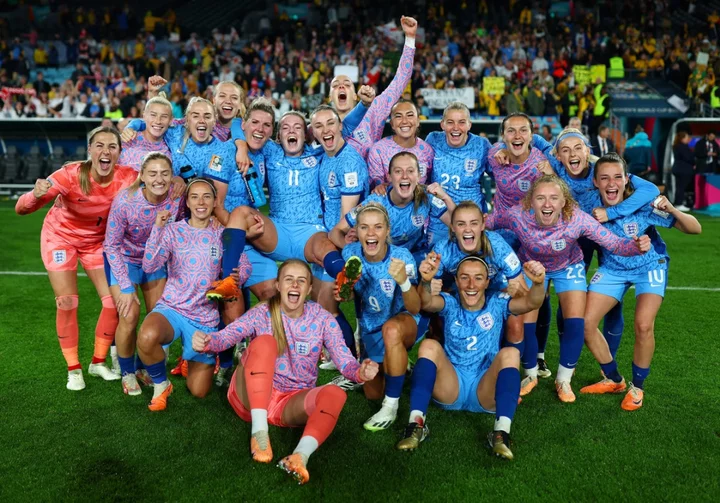
How to watch England vs Spain: TV channel and kick-off time for Women’s World Cup final
England play Spain in the Women’s World Cup final as the Lionesses look to bring home the game’s biggest prize for the first time. The nation is set to come to a halt as England play their first World Cup final, men’s or women’s, in 57 years. Manager Sarina Wiegman has urged her players to block out the “noise” of 1966 as England look to add the World Cup title to last year’s Euros triumph. The Lionesses reached the World Cup final for the first time with their 3-1 win over Australia in the semi-finals, with Wiegman’s side managing to stay cool to defeat the hosts with a clinical display in Sydney. Spain, who are also playing the first Women’s World Cup final, have navigated a player mutiny off the pitch and questions surrounding their manager Jorge Vilda, but ‘La Roja’ remain dangerous opponents and are led by their contingent of Barcelona stars. Here’s everything you need to know ahead of the World Cup final and find latest tips for the game itself here. When is England vs Spain? The Women’s World Cup final will kick off at 11:00am BST on Sunday 20 August at Stadium Australia, Sydney. What TV channel is it on? The World Cup final will be shown by both the BBC and ITV. Coverage on BBC One starts at 10am, while ITV’s coverage begins at 10:15am. It will also be available to watch online, on both the BBC iPlayer and on ITV X. What is the England team news? England have no injury concerns and the return of Lauren James means Sarina Wiegman has all 23 players available for the final. Wiegman faces a decision on whether to bring in James from the start, but is likely to stick with the team that performed so impressively against Australia. Mary Earps is a contender for the tournament’s golden glove and will start behind England’s back three of Jess Carter, Millie Bright and Alex Greenwood, with Lucy Bronze and Rachel Daly at wing-back. Should Toone start, the midfielder will play alongside Kiera Walsh and Georgia Stanway, with James remaining an excellent option to have on the bench. England’s front two of Alessia Russo and Lauren Hemp have struck up a deadly partnership and were both on target in the quarter-finals and semi-finals. Chloe Kelly will be among the other attacking options on the bench. What is the Spain team news? Spain face a big decision of their own, with Salma Paralluelo scoring in both their quarter-final win against the Netherlands and in the semi-final win against Sweden after coming off the bench. Head coach Jorge Vilda may decide to keep the 19-year-old winger as an impact substitute, with Alexia Putellas set to remain in the starting line-up even though she is yet to come to life at the tournament. Predicted line-ups Spain: Coll; Batlle, Parades, Codina, Carmona; Teresa, Bonmati, Putellas; Caldentey, Hermoso, Redondo England: Earps; Carter, Bright, Greenwood; Bronze, Stanway, Walsh, Daly; Toone; Hemp, Russo Read More England stand on the brink of history — and a moment to change the game forever Ella Toone or Lauren James? Sarina Wiegman has already made the biggest decision of England’s World Cup Infighting and rebellion: How Spain overcame themselves to reach edge of Women’s World Cup glory Sarina Wiegman thankful for ‘dream’ support as World Cup final set to unite country England vs Spain team news and predicted line-ups Women’s World Cup LIVE: England set for ‘game of our lives’ in final
1970-01-01 08:00
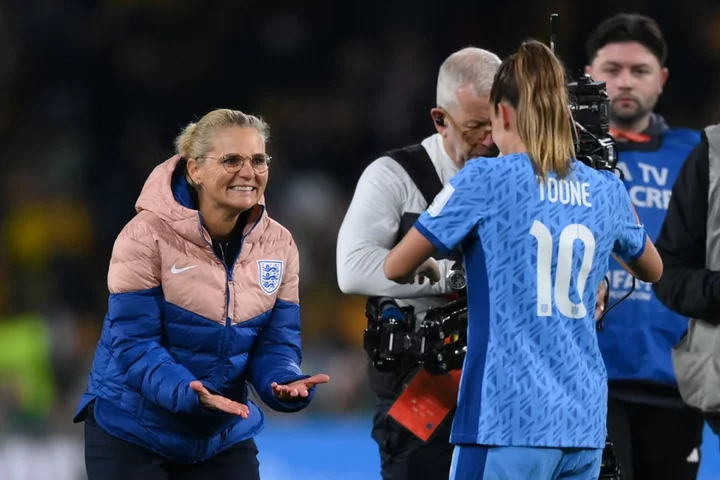
Women’s World Cup LIVE: Sarina Wiegman says ‘everyone’s talking about 1966’ and backs England to end hurt
England are counting down the hours until they play in their first Women’s World Cup final as Sarina Wiegman and her players prepare to face Spain for the title in Sydney on Sunday. It’s the first time the England men’s or women’s team have reached a football World Cup final since 1966, with the nation set to come to a halt as the Lionesses look to bring the game’s biggest prize back home. And manager Wiegman is well aware of the 57 years of hurt that the nation has endured and is backing her side to end that on Sunday morning. Wiegman will give a press conference this morning ahead of the final, after she confirmed she is happy as England manager and wants to see out the remainder of her contract, despite speculation linking the Lionesses boss to the United States, Meanwhile, Australia will look to finish their home World Cup on a high as they face Sweden in the third-place play-off in Brisbane. The Matildas were beaten by England in the semi-finals but will hope to sign off with a win after capturing the hearts of the nation during their record-breaking run. Follow all the build-up to England’s clash against Spain in the final, get all the latest Women’s World Cup odds here and find latest tips for the game itself here. Read More Sarina Wiegman: ‘Stop talking about the result — we know what we want’ Ella Toone or Lauren James? Sarina Wiegman has already made the biggest decision of England’s World Cup Sarina Wiegman commits future to England after USA speculation
1970-01-01 08:00
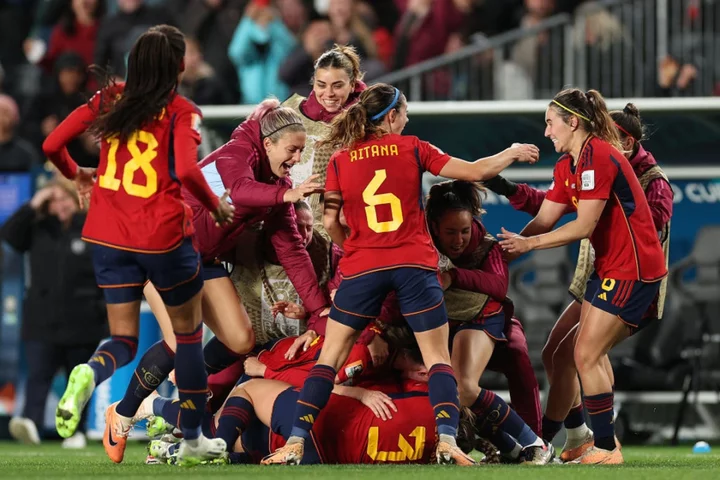
Infighting and rebellion: How Spain overcame themselves to reach edge of Women’s World Cup glory
With so much still unsaid around this Spain team, three statements over the last 48 hours stood out all the more, that illustrate much of the story of their Women’s World Cup run. One was Tere Abelleira immediately after the semi-final victory over Sweden in Auckland. “Now we can talk about a ferocious team spirit,” she said. It was as the midfielder was saying this in the Eden Park mixed zone that Jenni Hermoso was striding behind and shouting: “Come on! We’re in the final of the f***ing World Cup!” That is now the most important fact of all. It was amid this mood of jubilation, however, that the abrasive Spanish federation boss Luis Rubiales came out with something that was much more open to dispute. “What we have endured is a lot,” said Rubiales. “That questions have been asked of Jorge Vilda, who is a hard-working man, a world-class coach, who has turned down other federations that have offered more money and stayed with Spain. We have stuck with those who have always wanted to be here, that have valued the great work that he has done to grow, and we have forgotten the people with resentments. He has continued working with his people and not paid attention to those who wanted to destroy him.” It was the first time at this World Cup that anyone in the camp has publicly raised the squad mutiny that has shaped Spain’s entire run, since most of it has been set aside in an uneasy truce. The description of “people with resentments” sounds like the most cavalier way to blow all this up, especially as the biggest game of all remains. While that “ferocious team spirit” should be more than enough to keep Spain together through the build-up, there is still the possibility for a huge fall-out if this team is defeated by England on Sunday. Rubiales’ words only add another edge to a situation that is already hugely complicated, both in terms of how it came to this and how everyone is dealing with it. It is not just about Vilda, although he is the most public face, visibly ignored by some players in victory but embraced by others. The 15 players who last year sent the email resigning from the national team – with the tacit support of Alexia Putellas, Jenni and Irene Paredes – had several complaints. Most focused on how oppressively disciplinarian Vilda’s managerial regime was but they were also unhappy about how outdated the entire international set-up seemed. Some of the arrangements, like travelling long distances on bus or not having staff in certain key roles, fell well below their club standards. They did not feel any of this gave them the best possible chance of fulfilling a generation of talent. Unsaid but undeniably perceived by so many around the situation is that some of the players do not think Vilda is a good enough manager. There is at least a fair argument to this, even as Rubiales protested he is “a world-class coach”. Many would certainly dispute that. That Vilda has such a strong relationship with Rubiales is just another complication. With the federation risking the chance of a generation, and some players realising the same, overtures were made. Hermoso and Paredes returned, opening a way back. The federation’s director of women’s soccer, Ana Alvarez, met with every single player individually over May and June. All complaints were heard. Only some players were accepted back, and that involved having to send an email declaring their willingness to be called up again. They were Ona Batlle, Mariona Caldentey and – above all – Aitana Bonmati, perhaps the best player in the world right now. Vilda decided to stick with the players involved in preparation for this World Cup, just as Rubiales decided to stick with him. It has resulted in a squad that is partly made up of rebels and replacements. Some have set aside grievances for the greater good. Others are grateful to Vilda for persisting with them. All have overlooked this for the time being, which was why Rubiales so abrasively addressing it before the final is such a risk. It has only complicated already conflicted feelings around this Spain team. A growing view at this World Cup and back home in Spain has been that most support the players but do not want the national team to win because that is a vindication for the federation and Vilda. It doesn’t help Rubiales that he is not a popular figure, commonly seen as one of the most divisive in Spanish sport. There is also some inevitable backlash against the players, since there is the constant threat of the issue getting subsumed into the usual culture wars, but this is where the general public parking of the mutiny has at least offered something like a positive. One figure with insight into the situation spoke of how there can be internal conflict for some players, too. They want to do the best for themselves, but know that every success makes the federation and the manager look good. For the moment, at least, it has been a more unusual example of the classic dynamic of adversity creating success. There has also been compromises and common ground. Vilda’s staff have softened some approaches. The federation has listened and acted on other concerns, such as the willingness to move camp when the players were bored out of their minds in Palmerstown North. Some of Vilda’s calls have worked, such as bringing teenage sensation Salma Paralluelo on as a substitute to break games. Others would say that’s just an obvious move. There is also a more obvious fact here. In a historic football shift that long preceded Rubiales, and greatly influenced the English Football Association, Spain were one of the first wealthy western European football cultures to implement the kind of coaching revolutions that has characterised the modern game. The country industrialised talent production, while going further than most similar federations in underpinning it with a defined football identity. While that has almost come back on itself in the men’s game, creating this self-repeating and now almost self-defeating cycle of the ball endlessly getting circulated, the more developmental stage of women’s football means it can be much more effective. Spain are one of the few teams at this World Cup with such an ingrained style, made in Barcelona, that goes much deeper than any coaching decision. The wider national coaching structure has meanwhile honed the natural talent of stars like Putellas and Bonmati, producing elite athletes that also have that resilience that has been so apparent at this World Cup. The likelihood is that this supersedes any of Vilda's decisions. The squad’s mentality has helped, which is why they didn’t buckle after the collapse against Japan during the group stage. In a strange way, that 4-0 defeat might even have served them, helping to solve further tactical issues. Bonmati even said at the time “this is going to unite us more than ever”. It could mean Spain become the only world champions in either men’s or women’s football to have also lost by more than three goals in the same competition, other than West Germany 1954. Japan 2011 are the only previous Women’s World Cup winners to have even lost a game, adding one other little twist. There is then one final layer. It was the frustration at a defeat to England in the Euro 2022 quarter-finals that brought all this to a head. It is now an even bigger game against England that might fully illustrate how they have adapted. A lot may remain unsaid after Sunday but, to use an old Spanish football saying, some of the truth will be on the pitch. Read More Gustaf Lagerbielke set for Celtic bow after Stephen Welsh sustains knock Theo Walcott shares career highlights as he announces retirement from football Ange Postecoglou insists Tottenham have to be ‘united on and off the field’ Gustaf Lagerbielke set for Celtic bow after Stephen Welsh sustains knock Theo Walcott shares career highlights as he announces retirement from football Ange Postecoglou insists Tottenham have to be ‘united on and off the field’
1970-01-01 08:00
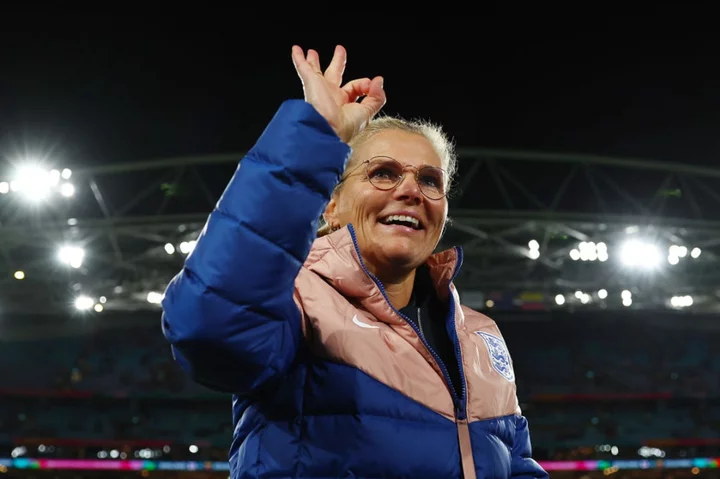
Sarina Wiegman: ‘Stop talking about the result — we know what we want’
When it gets to this stage before a big game, even someone as experienced as Sarina Wiegman finds she can’t take her mind off it. Or, rather, she doesn’t want to take her mind off it, which is precisely why she’s so experienced. “No, and I don’t want to relax,” she smiles. “It’s Spain,” Wiegman says of her thoughts before taking on Sunday’s opponents. “Everything now is Spain. When you’re so close, well, I have that feeling a little bit anyway, but when you go to the next game, you’re only thinking ‘OK, what’s next? What can we get in front of us? What challenges can we expect? How are we going to prepare the team? “I just want to get ready.” Wiegman has ensured England have never been more ready. The national team are on the brink of bringing a decade-long project to glorious completion and winning a first ever Women’s World Cup because of her crucial influence. The 53-year-old from The Hague can now be classed as the best manager in the game. While the key elements of that story are tactics, patience, strategy and the will – as well as investment from the FA – to hire a manager this good, there is also something acutely personal. Wiegman can talk with authority about the rarefied build-up to such games because this is her fourth major international final, and her second World Cup final. It may also be her first World Cup final win. She has already got so close with the country that means the most to her, having narrowly lost 2-0 with the Netherlands to the USA in Lyon four years ago. Something has changed for Wiegman since then, though. England has changed her, even if her effect on the national team has been far greater. The manner in which Wiegman quickly moves on from questions about herself to talking about the collective is fairly typical, especially in the days before a game. She tends to be much more expansive after a match, and the belief from those who know her is that it’s not just about ultra-focus. It’s also about giving absolutely nothing away to the opposition. She is that guarded when it comes to the game. One of the more surprising elements of a sit-down with Wiegman at England’s Terrigal base, so close to the biggest fixture in sport, is how relaxed she is and how willing she is to get into the personal. There is constant laughter – especially as she elaborates on Dutch directness against English politeness – but also a moment of poignancy as she discusses the various challenges she and the team have faced. The injuries are only a small part. Of true significance is her ongoing adjustment to life without her sister, who tragically passed away shortly before the Euro 2022 campaign. “I’m a pretty positive person but of course I also have feelings,” Wiegman says. “I feel very privileged to work with this team. It has been so great. You have some setbacks with some players that got injured, which was very sad for them, but then you have to switch and say: ‘OK, this is the group of players we think are the best and this is the team now. We are going to go to the World Cup with them.’ “Then of course there are still things in my personal life. When someone passes away who is really close to you, you don’t just say: ‘Oh, it’s two months now, it’s gone.’ I have strategies but of course sometimes that’s still sad and it is challenging for me too.” It was Wiegman’s human nature, as much as her managerial insight, which was why the Football Association were so willing to wait for her in September 2021. So many of the other pieces were already in place, not least a brilliant generation of players. That came from a coaching revolution, and huge investment in the wider game. It just needed, in the words of chief executive Mark Bullingham and women’s technical director Kay Cossington, someone to bring it all together. “She’s created a really strong culture,” Bullingham says. “You can see what she brings in camp in terms of the togetherness. You can see how she galvanises anything, the fact there was a strong plan in place already just means it’s come to fruition really nicely.” That does make it sound much easier than it was, which is admittedly how Wiegman makes it look, certainly at Euro 2022. Even to get there, she had to work around English football culture as much as with her squad. So much of that still centres on 1966, that long wait, that block. “I know it’s there,” she says. “When we started working, September 2021, I felt that the country was so desperate to win a final in a tournament. Everyone was saying that and the players too. I thought: ‘It’s very real’.” She felt it was having an effect, so had to work against it. “If you want to win it too much… so what do we have to do? What do we have to do to win, and how can we win? To get results, stop talking about the result because we know what we want. I heard again: 1966. Everyone’s talking about 1966. So let’s be at our best on Sunday and try be successful.” While she insists she gets “out of the noise”, she is clearly animated by this topic, as she immediately apologises for interrupting another question to go straight back to it. “Another thing: football is so big in England. It’s so in the culture. That’s incredible to experience. It’s so big. It’s everywhere. That’s pretty cool, too.” The way Wiegman speaks about this gives an insight into how she works. She doesn’t view it as a profound issue of national identity. She views it as just another problem to solve. That has been the story of her time in the job and, especially, this campaign. Runs like Euro 2022 and this World Cup don’t just come from placing someone like this in a job, after all. It requires proper impact on the training ground. Wiegman found this very quickly with how she figured out the team before Euro 2022, and it admittedly did help that almost everything seemed to go for England in that tournament - not least home advantage. This World Cup has been the exact opposite. Almost everything has gone against them, right down to the crowd in repeated games, above all that semi-final against Australia. Every test has just given Wiegman and her team something new, though, particularly England’s 3-5-2 formation. The biggest test was clearly the loss of three key Euro 2022 players in Leah Williamson, Fran Kirby and Beth Mead, with Lauren James’ suspension from the last 16 only compounding that. As tends to be the case with Wiegman, she and her staff had already anticipated some of the problems. As has tended to be the case with this World Cup, though, there were still more issues. One was how constricted the team looked in those opening 1-0 wins against Haiti and then Denmark. “During the tournament in the first two matches we were struggling a little bit and we had moments where we played really well but we also had moments where we were a little bit vulnerable. So, after the second match, Arjan [Veurink, assistant manager] came to me and said: ‘Sarina, let’s sit down, isn’t this the time to go to 3-5-2?’ “I said: ‘You’re completely right, this is the moment’. With how the squad is built, and the players available, we can get more from the players and their strengths in this shape. So then we changed it.” Tactical insight alone only goes so far, though. Maximising it depends on communication, and understanding. This is another of Wiegman’s qualities. The players feel she is very straight with them. Some of this might touch on her own thoughts about English politeness against Dutch directness. She feels she now understands her adopted country much more. “I tried to learn a little bit more about the English,” she says. “The sayings sometimes are a problem, so I’m trying to learn a little bit more. I do think I understand the people a bit more but English people are very polite and sometimes you go ‘OK, are you now being polite or are you really saying what you mean? “And that’s sometimes finding a balance, because you don’t have to be rude to be direct, so I ask the players and the staff: ‘You can be honest’. It doesn’t mean that you’re rude. Just be direct.” Dutch, in other words? “Yeah,” she laughs. “Dutch, but direct doesn’t mean rude. You can just say what you think and still be very respectful.” It’s why you can take her at face value when she says she isn’t considering any overtures from the United States. Wiegman of course doesn’t actually want to be discussing any of this now, and not just for reasons of diplomacy. “We are in the final, but everything now, all my thinking, is how do we beat Spain.” It’s an insight into why she’s there in the first place. Read More Sarina Wiegman commits future to England after USA speculation England’s deadly duo have already provided the answer to the Lauren James debate What time is the World Cup final on Sunday and who will England play? Sarina Wiegman v Jorge Vilda – a look at the World Cup final coaches Eddie Howe wishes ‘remarkable’ England well in World Cup final Sarina Wiegman clarifies England future after USA speculation
1970-01-01 08:00
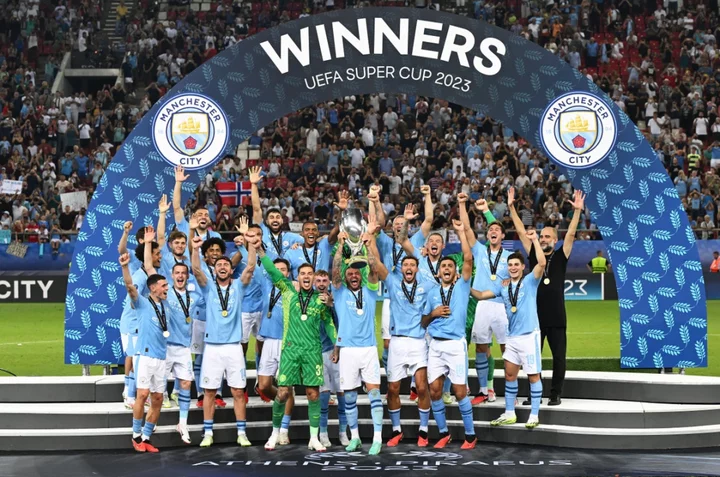
Manchester City’s Super Cup victory shows that Cole Palmer is a gem to be treasured
First Istanbul, then Athens. Manchester City have bookended their summer by going from east Manchester to eastern Europe and returning with continental trophies. They added the Super Cup to the Champions League, their fourth piece of silverware of 2023, when Sevilla’s Nemanja Gudelj became the only player to miss in a penalty shootout. Erling Haaland, Julian Alvarez, Mateo Kovacic, Jack Grealish and Kyle Walker – the captain, a particularly rare penalty taker, breathed a sigh of relief when his effort squeezed under Bono – found the net in an increasingly tense shootout. There was outstanding goalkeeping in the preceding 90 minutes but neither Ederson nor Bono made a save thereafter and when Gudelj’s spot kick was a fraction high, the City celebrations began. If Ederson was one who starred for a depleted City side, so did Cole Palmer, the youngster developing a taste for the big occasion. In two August finals, Palmer has scored two excellent goals, a Community Shield strike and a Super Cup equaliser; only Michael Owen had previously done the double of scoring in each in the same season. Each goal may have been a blow to the clubs hoping to take Palmer on loan: he is staking a case to be involved at the Etihad Stadium more often. Scorer of the Champions League final winner, Rodri, added a Super Cup assist with a deep cross. Palmer stole in at the far post to head back across goal and, buoyed by his goal, he sought a winner with a shot Bono parried, one which followed an audacious drag-back. It was a display to suggest he can take over seamlessly from Riyad Mahrez as the goalscoring left-footed, right winger. The Algerian tweeted approvingly about the young pretender’s performance. It was nevertheless notable that City’s contingent of high-class passers was depleted since the Champions League final, with the Barcelona-bound Ilkay Gundogan, ill Bernardo Silva and injured Kevin De Bruyne all absent. It may have been reflected in a lack of creativity which, in turn, may prompt another bid for West Ham’s Lucas Paqueta. And yet City still had the opportunity to score rather more. But they encountered wonderful resistance by the defiant Bono, who made a series of excellent saves, bookended by early and late stops from Nathan Ake, who perhaps ought to have scored with each header. City ended up with 22 shots though, from their perspective, too few from Haaland, who is still yet to score for them in a final. They had to come from behind against underdogs. Sevilla had ensured the Super Cup would not be an all-Mancunian affair, eliminating Manchester United from the Europa League. Sevilla have lost their influential director of football, Monchi, in the summer and some players could follow but they retain a spirit that has rendered them fearsome competitors on the European stage. The energetic Lucas Ocampos was excellent, in the age when the classic No. 9 has started to look an endangered species, Sevilla got a trademark goal for a true centre-forward. It was a bullet header from Youssef En-Nesyri, rising above Ake to meet Marcos Acuna’s cross. Yet he and Sevilla could rue an inability to score a second when they broke at speed and with menace. En-Nesyri ought to have had a second brace against a Manchester side in 2023, spurning two chances. First, Lucas Ocampos released him on a counter-attack but Ederson saved his shot, then the Brazilian made another stop. It amounted to a difficult full debut for Josko Gvardiol. The £77 million defender’s previous appearance in European club competition was a 7-0 defeat for Leipzig, against City. If this was less painful, City missed Ruben Dias and John Stones, who were both only on the bench after missing the win at Burnley. For much of the match, though, City were attacking. Jose Luis Mendilibar has been billed as the Spanish Tony Pulis, a veteran relegation firefighter who is unafraid to adopt direct tactics. Sevilla were content not to have the ball; Mendilibar does not burden his side with a passing philosophy. As City had around three-quarters of possession, Sevilla were increasingly penned in. Pressure eventually told and history was made. Guardiola had won this trophy with both Barcelona and Bayern Munich, the latter courtesy of Jupp Heynckes’ treble-winning feats. He became the first manager to win the Super Cup with three different clubs. His determination was apparent: whereas in the Community Shield, he removed Haaland, in Athens, he kept 10 of the starters on for the full 90 minutes, substituting only Palmer, and three days before a clash with Newcastle. Yet winning the Champions League brought other prizes, the chance for more silverware, and City already have their first trophy of the season. Read More Kevin De Bruyne facing up to four months out and may require surgery Man City fears grow after Kevin De Bruyne hamstrung by the same old problem Man Utd confirm Mason Greenwood investigation is over - but no decision on future made
1970-01-01 08:00
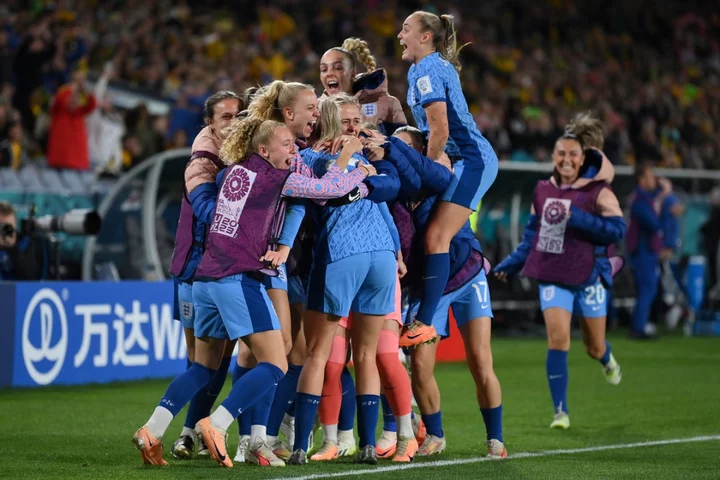
England finally reach the world’s greatest stage and their achievement is worth celebrating
Alex Greenwood claimed she “cannot put it into the words”, so she just kept repeating the words that made her feel like that. “We’re in a World Cup final.” “I just keep having to say it,” she laughed. It is a glorious fact worth actually reflecting on, even as thoughts quickly turned to Sunday, what next, who starts, whether Lauren James comes in. If actually winning the World Cup is the great ambition of any career, the final itself is the great stage. Those who step onto the pitch will leave their own mark on history, the very line-ups part of the record that makes football so rich. “We wanted to take England and women’s football to a new level and we have certainly done that over the last 12 months,” Ella Toone said. They’ve taken it all to the highest level for the very first time. That is worth celebrating, as Sarina Wiegman and the players insisted they would be doing. The squad were loving it out on the pitch but, as the Stadium Australia sound system played the Fifa-approved songs, they quickly realised they wanted to get into the dressing room and play their own music. This was the overriding feeling as they then made their way through the mixed zone. “We will celebrate tonight, I’d rather be in the changing room than talking to you lot,” Toone smiled. Everything they said still captured all it means. Some of them might have been cliches, but they’re cliches for a reason. They’re just what comes to mind as you try to make sense of something that goes beyond your imagination; your hopes. “It’s unbelievable, this is what dreams are made of,” Chloe Kelly said. “It is history,” Lucy Bronze added. Toone, meanwhile, graciously spoke a lot despite pleading she was so eager to get away. “This is going to be the biggest game of our careers.” That’s apt, because this - to quote their manager - has been a team that has grown with this World Cup. That is the major theme of, and explanation for, England’s historic run to the final. Performances have gotten better. Key players, and especially the attackers, have found form. Solving so many problems has honed the team. It meant they were supremely primed for what was supposedly their biggest test so far, a semi-final against a fine Australia in front of a fervent home crowd. There was even the shock of Sam Kerr’s thunderbolt, and a brief period where it seemed like it could all turn. Not a bit of it. Weaker sides, or even previous England teams, might well have wilted at that point. England turned it into their second biggest win of the World Cup so far, three of their attackers fittingly scoring again. “We just have this belief, nothing fazes us,” Toone added. “We face a lot of challenges this tournament and we have come through every one of them.” Lucy Bronze echoed that. “This tournament we’ve had so many things go against us, red cards, key players getting injured before the tournament, during the tournament, going a goal down in the last game, going against the host nation, everyone’s throwing everything at us including the kitchen sink. And we’ve just won games.” The variety of ways they have to win was pleasingly followed by the variety of the goals. One was just a straight contender for goal of the tournament, even as it swerved into the top corner, a moment of pure quality. “Honestly, that’s the best shot I’ve hit in my life,” Toone said. The second was a classic piece of opportunism, if from a rudimentary approach. Lauren Hemp had to be there, though, just as she was almost everywhere throughout this semi-final. “She has been like that the last few games,” Toone said. “She is just a nuisance. She runs in behind, she comes to feet, she is fast and she is strong. I think she would be a nightmare to play against and she has shown that today with a goal and an assist too . But it’s a team performance, we all dug deep.” The last from Alessia Russo was a classic striker’s finish, after some deft play from Hemp. It all makes it very difficult for Wiegman to bring Lauren James back in. This has been another irony of the World Cup, that shows how well England have adapted. Wiegman generally doesn’t like to change a team that works, but has been forced to do so at pretty much every step. Now, as the path clears to the grand stage, she will surely keep it as is. James might even be better value as a potential game-changer to come on. Even someone as meticulous and forward-thinking as Wiegman, however, admitted that was something to consider tomorrow. Now was the time to just be happy. Hence there was a joyous response when Greenwood was asked about previous semi-final disappointment in 2015 and 2019, and how England had never previously got this far. “That’s something we don’t have to think about any more.” There was now only hope, ambition, dreams coming true. “I’ve always said the one thing I’ve wanted for England is to get a star above my crest,” Bronze said. “The men have it and we don’t, so finally we can share the same crest.” Read More Sensational England capitalise on Sam Kerr’s missed moment to make World Cup history How England deployed dark arts and cool heads to silence Australian noise Sarina Wiegman: Inside the ‘genius’ mind behind England’s run to the World Cup final Lionesses celebrate reaching World Cup final – Wednesday’s sporting social Lauren Hemp hails ‘special’ England as Ella Toone toasts ‘best shot’ of her life Sarina Wiegman v Jorge Vilda – a look at the coaches in Women’s World Cup final
1970-01-01 08:00
